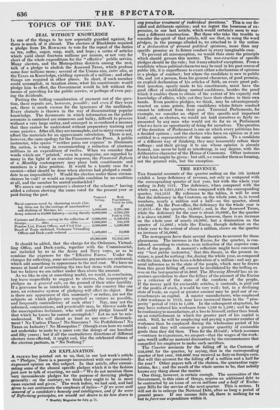TOPICS OF THE DAY.
ZEAL WITHOUT KNOWLEDGE Is one of the things to be now especially guarded against, for there is much of it abroad. The electors of Blackburn required a pledge from Dr. BOWRING to vote for the repeal of the duties on tea, coffee, sugar, soap, malt, and hops ; a series of articles which yield about fourteen millions per annum, or not very far short of the whole expenditure for the "effective" public service. Many electors, and • the Metropolitan districts among the rest, talk of .a pledge to abolish the Assessed Taxes, which produce some four millions more; several of the Unions aim, inter alio, at the Taxes on Knowledge, yielding upwards of a million; and other things are required in other places. In short, if each member could accomplish, in taxation alone, what his constituents would pledge him to effect, the Government would be left without the means of providing for the public service, or perhaps of even pay- ing the dividends. Putting the trifling consideration of payment out of the ques- tion, these repeals are, however, possible; and even if they were not, there is much excuse for the ignorance of the multitude. Every obstacle is thrown in the way of disseminating popular knowledge. The documents in which information on the public accounts is contained are numerous and bulky, difficult to procure without a very large outlay, and arranged in so confused a manner that they cannot be understood without preparatory training and some practice. After all, they are incomplete, and in many cases only afford the materials for an approximate calculation. There is not, however, the same apology for the Financiers of the Press. A public instructor, who spares "neither pains nor expense" to illuminate the nation, is wrong in recommending a reduction of nineteen millions in an expenditure of twelve. When we consider that words which are "printed," even in a magazine, are regarded by many in the light of an oracular response, the Financial Reform of a Monthly contemporary may place both constituents and members in a false position. It would be a knotty case for a casuist—what should be done when electors had pledged a candi- date to an impossibility ? Would the election under these circum- stances be void? or would an impossible condition be no condition at all, and the member be seated unshackled?
We annex our contemporary's abstract of the scheme ;* having added a column showing the sums voted for the present year or paid during the past.
Saving.
Naval expenses saved by chartering vessels (itir-
log them out for the carriage of merchandise) .-E
and abolition of Marines, Sze. 5,800,000 ...
Expenditure. Voted for 18:12.
..*:
3,290,806
Army reduced to10,000 Infantry—saving thereby 6,000,000 ...
4,910,278
Paid in 1531.
Customs and Excise—saving in the collection of 3,000,000 ... 2,449,815 Stamps ditto ditto 1,000,000 ... 185,109 Pension List, Patent Offices, and Civil List 2,000,000 ... 1,500,000 Board of Trade abolished, 'Ordnance Victualling
Offices and Dock-yards reduced 1,500,000 ... 12,000 19,300,000 12,352,508
It should be added, that the charge for the Ordnance, Victual- ling Office, and Dock-yards, together with the Commissariat, are included by us in the Army and Navy votes, so as to combine the expenses for the "Effective Forces." Under the charges for collecting, some miscellaneous payments are embraced, which add something in appearance to the real cost. We have no means at hand of ascertaining the two last items with exactness, but we believe we are rather under than above the amount.
As we like to aim at something useful, we would, in conclusion, beg leave respectfully to suggest to electors, the impropriety of pledges as a general rule, on the ground of their utter inutility. If a grievance be so intolerable as to unite the country like one man, an extensive system of pledging will effect its object. But is there any appearance of this unanimity ? or rather, are not the subjects on which pledges are required as various as possible, and frequently contradictory of each other ? Nay, may not the informed, conscientious, and practicable man, be thrown aside for the unscrupulous declaimer, who will readily pledge himself to that which he knows he cannot accomplish ? Let us not be mis- understood. We will shout as loud as any one—" Retrench- ment! No Useless Places! No Sinecures ! No Prohibitions! No Taxes on Industry ! No Monopolies !" (though even here we could Rot undertake to undo by a mere vote the doings of one hundred and fifty years) ; but if all the contradictory directions of different electors were effected, it might end, like the celebrated climax of the election partisan, in "No Nothing !"
Proposed Real


























 Previous page
Previous page